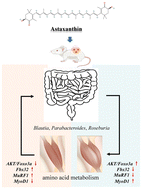Astaxanthin slows down skeletal muscle atrophy in H22 tumor-bearing mice during sorafenib treatment by modulating the gut microbiota†
Abstract
Astaxanthin is a carotenoid that is taken orally and has antitumor and anti-inflammatory properties. Our previous research demonstrated that astaxanthin alleviated skeletal muscle atrophy during sorafenib treatment in H22 tumor-bearing mice and altered the intestinal flora composition. However, the relationship between astaxanthin's amelioration of skeletal muscle atrophy in tumor-bearing mice and its ability to regulate intestinal flora is not clear. We used broad-spectrum antibiotics to create pseudo-sterile tumor-bearing mice, which we then used in fecal bacteria transplantation experiments. Our results indicate that the role of astaxanthin in ameliorating skeletal muscle atrophy during molecularly targeted therapy in mice with tumors is dependent on the intestinal flora. Astaxanthin substantially promoted the proliferation of Blautia, Parabacteroides, and Roseburia, altered the levels of metabolites in mouse serum, and primarily affected the amino acid metabolism of mice. Astaxanthin ameliorated skeletal muscle atrophy by promoting the activation of AKT/FOXO3a, which inhibited the expression of ubiquitination-degrading Fbx32 and MuRF1 and promoted myogenesis in skeletal muscle. Our study confirms that the intestinal flora is an important target for astaxanthin to combat skeletal muscle atrophy. Our research supports the use of astaxanthin as a nutritional supplement and intestinal microecological regulator for cancer patients.

- This article is part of the themed collection: Food & Function HOT Articles 2023


 Please wait while we load your content...
Please wait while we load your content...